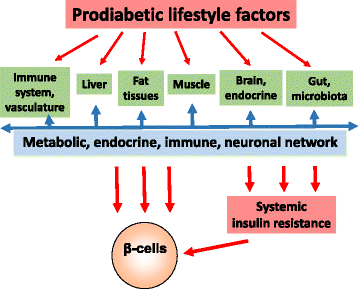Environmental/lifestyle factors in the pathogenesis and prevention of type 2 diabetes
- PMID: 28720102
- PMCID: PMC5516328
- DOI: 10.1186/s12916-017-0901-x
Environmental/lifestyle factors in the pathogenesis and prevention of type 2 diabetes
Abstract
Background: Environmental and lifestyle changes, in addition to the ageing of populations, are generally believed to account for the rapid global increase in type 2 diabetes prevalence and incidence in recent decades.
Discussion: In this review, we present a comprehensive overview of factors contributing to diabetes risk, including aspects of diet quality and quantity, little physical activity, increased monitor viewing time or sitting in general, exposure to noise or fine dust, short or disturbed sleep, smoking, stress and depression, and a low socioeconomic status. In general, these factors promote an increase in body mass index. Since loss of β-cell function is the ultimate cause of developing overt type 2 diabetes, environmental and lifestyle changes must have resulted in a higher risk of β-cell damage in those at genetic risk. Multiple mechanistic pathways may come into play.
Conclusions: Strategies of diabetes prevention should aim at promoting a 'diabetes-protective lifestyle' whilst simultaneously enhancing the resistance of the human organism to pro-diabetic environmental and lifestyle factors. More research on diabetes-protective mechanisms seems warranted.
Keywords: Diabetes prevention; Diabetes risk factors; Diet; Environment; Lifestyle; Physical activity; Type 2 diabetes; β-cells.
Conflict of interest statement
Consent for publication
Not applicable.
Competing interests
The authors declare that they have no competing interests.
Publisher’s Note
Springer Nature remains neutral with regard to jurisdictional claims in published maps and institutional affiliations.
Figures

References
-
- Ng M, Fleming T, Robinson M, Thomson B, Graetz N, Margono C, et al. Global, regional, and national prevalence of overweight and obesity in children and adults during 1980-2013: a systematic analysis for the Global Burden of Disease Study 2013. Lancet. 2014;384:766–81. doi: 10.1016/S0140-6736(14)60460-8. - DOI - PMC - PubMed
-
- Ballestri S, Zona S, Targher G, Romagnoli D, Baldelli E, Nascimbeni F, et al. Nonalcoholic fatty liver disease is associated with an almost twofold increased risk of incident type 2 diabetes and metabolic syndrome. Evidence from a systematic review and meta-analysis. J Gastroenterol Hepatol. 2016;31:936–44. doi: 10.1111/jgh.13264. - DOI - PubMed
Publication types
MeSH terms
LinkOut - more resources
Full Text Sources
Other Literature Sources
Medical

